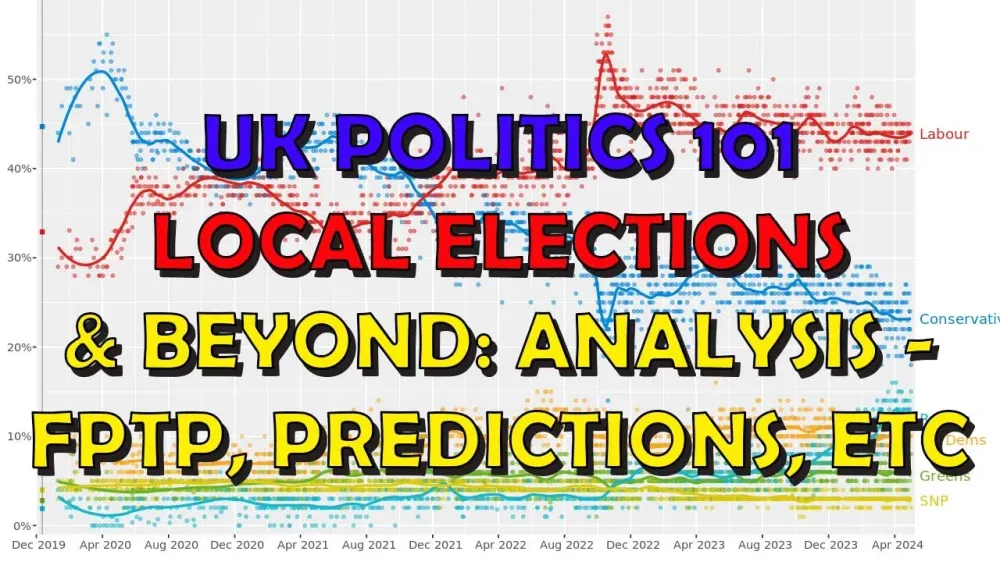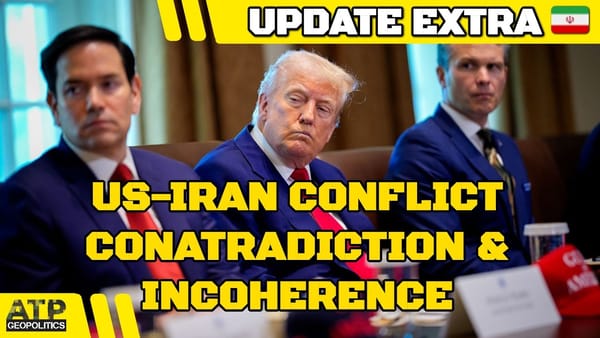UK Politics 101: 2024 Local Elections - What They Tell Us, & Analysing the General Election
Table of Contents 📖
"I'm not advocating Greens. I'm advocating fairness."
Hello Team
🎦 00:00-01:00⏩
Jonathan welcomes viewers to a UK election political analysis video. He explains that he is interested in UK politics and hopes it is useful to viewers, especially those who are not from the UK. He notes that support for Ukraine is bipartisan.
Return to top⤴️
UK Voting System
🎦 01:00-03:31⏩
Jonathan discusses the UK voting system, known as First Past the Post, which he believes is suboptimal. He explains that it can lead to situations where the majority of voters in a constituency do not support the elected candidate, leading to a lack of representation and wasted votes. He also points out that the system benefits large parties and disadvantages smaller parties.
Return to top⤴️
Political Spectrum in the UK
🎦 03:31-04:10⏩
Jonathan provides a visual representation of the UK's political landscape, using a map. He explains that the Labour Party sits broadly on the left, the Conservatives sit on the right, the Liberal Democrats sit in the center-left, the Greens sit on the far left, and Reform UK sits on the far right. He highlights the presence of regional parties, such as the Scottish National Party (SNP) and Plaid Cymru.
Return to top⤴️
Scottish National Party (SNP)
🎦 04:10-04:58⏩
Jonathan discusses the SNP, emphasizing the party's dominance in Scottish politics and the implications for Labour. He explains that the SNP's success has made it difficult for Labour to secure a majority government in the UK.
Return to top⤴️
Disadvantage of the UK Voting System: Wasted Votes
🎦 04:58-08:46⏩
Jonathan continues to highlight the disadvantages of First Past the Post, illustrating with an example of a constituency. He explains that a candidate can be elected even if they have a minority of the votes, effectively disenfranchising those who voted for other candidates. He argues that this system makes it difficult for smaller parties to gain representation, as their votes are often wasted.
Return to top⤴️
Advantages and Disadvantages of First Past the Post
🎦 08:46-09:47⏩
Jonathan briefly touches on the advantages of First Past the Post, such as cost-effectiveness and speed. He concludes that these advantages are outweighed by the system's significant disadvantages, primarily its lack of representativeness.
Return to top⤴️
First Past the Post and Disproportionate Representation
🎦 09:47-15:31⏩
Jonathan uses the 2019 UK general election results to demonstrate how First Past the Post can lead to disproportionate representation. He highlights the example of the Liberal Democrats, who won only 11 seats despite receiving 11.55% of the national vote, and the Green Party, who received 2.61% of the vote but won only one seat. He also mentions the UK Independence Party (UKIP), which received 4 million votes but zero seats.
Return to top⤴️
The Alternative Vote (AV) Referendum
🎦 15:31-15:55⏩
Jonathan discusses the AV referendum, which was held in 2011. He explains that David Cameron, then Prime Minister, campaigned against AV after realizing that the "yes" vote was winning in the polls.
Return to top⤴️
The Split Left Vote
🎦 15:55-21:43⏩
Jonathan analyses how the left vote in the UK is split across multiple parties, including Labour, the Liberal Democrats, Greens, and the SNP. He explains that this division makes it challenging for the left to gain power, especially under the First Past the Post system. He also highlights the impact of the media landscape on the left, noting that there are very few left-leaning newspapers with a national readership.
Return to top⤴️
Conservative Party's Challenge
🎦 21:43-23:50⏩
Jonathan explores the challenges facing the Conservative Party. He explains that the party needs to court the centre ground but also needs to maintain its appeal to the far right. He argues that this is a difficult balancing act and that the Conservative Party is being squeezed by both Reform UK and the left-leaning parties.
Return to top⤴️
Labour's Challenges
🎦 23:50-26:30⏩
Jonathan examines Labour's challenges, including the split left vote and the dominance of the SNP in Scotland. He notes that Labour has been performing well in opinion polls but is being helped by Reform UK, which is siphoning votes from the Conservatives.
Return to top⤴️
The Importance of Scotland for Labour
🎦 26:30-28:54⏩
Jonathan emphasizes the importance of Scotland for Labour's electoral success. He explains that Labour used to have a stronghold in Scotland, but the SNP's rise has made it difficult for the party to secure seats in the region. He suggests that the recent controversies surrounding Nicola Sturgeon and her husband might present an opportunity for Labour to fight back in Scotland.
Return to top⤴️
The Two-Party System in the US and the UK
🎦 28:54-29:53⏩
Jonathan discusses the two-party system in the US and the UK. He argues that the UK is moving away from a two-party system, but that the transition is slow and challenging. He emphasizes that the US political system remains stuck in a two-party system, and that electoral reform is needed to ensure better representation of the electorate.
Return to top⤴️
The US Political Spectrum and the Importance of the Centre Ground
🎦 29:53-33:25⏩
Jonathan explains that in a two-party system, both parties should focus on winning over voters in the centre ground. He argues that politicians who court the extremes risk alienating moderate voters. He uses examples like Bill Clinton's successful campaign and Tony Blair's strategy in 1997 to illustrate the importance of focusing on the centre ground.
Return to top⤴️
The Changing UK Political Landscape
🎦 33:25-34:27⏩
Jonathan discusses the evolving UK political landscape. He explains that both Labour and the Conservatives are now facing challenges due to the emergence of new parties and the fragmentation of the electorate. He argues that the Conservatives are struggling to balance their appeal to both the centre ground and the far right.
Return to top⤴️
Jeremy Corbyn's Left-Wing Policies
🎦 34:27-36:38⏩
Jonathan discusses Jeremy Corbyn's leadership of the Labour Party. He explains that Corbyn's left-wing policies, while popular with some voters, led to a negative perception of him in the media. He highlights the disparity between Corbyn's policies and the perception of him in the media.
Return to top⤴️
Keir Starmer's Centre-Ground Strategy
🎦 36:38-37:19⏩
Jonathan discusses Keir Starmer, the current Labour leader, and his strategy of moving the Labour Party to the centre ground. He acknowledges that this strategy may alienate some left-wing voters, potentially leading to a split vote. He also discusses Labour's past support for Israel and its possible impact on future elections.
Return to top⤴️
The 2024 Local Elections: A Mini General Election
🎦 37:19-38:06⏩
Jonathan provides context for the 2024 local elections, describing them as a mini general election. He explains that the elections were not widespread but could still provide valuable insights into the national political landscape. He also mentions that in an election year, local elections are often influenced by national issues.
Return to top⤴️
Local Election Results
🎦 38:06-40:10⏩
Jonathan presents the results of the local elections, highlighting Labour's gains, the Conservatives' losses, the Liberal Democrats' gains, and the Greens' significant performance. He notes that Reform UK, despite polling at 13%, won only two seats.
Return to top⤴️
Media Bias and the Underrepresentation of Smaller Parties
🎦 40:10-42:45⏩
Jonathan expresses his concern about the media's bias towards major parties and divisive parties. He contrasts the media coverage of Reform UK and the Green Party, highlighting the disparity between the two parties' media attention despite the Greens' significantly better performance in the elections. He argues that this media bias is unfair and undemocratic.
Return to top⤴️
The Importance of the Reform Vote
🎦 42:45-45:22⏩
Jonathan analyzes the significance of Reform UK's vote in the local elections. He suggests that Reform UK's success could potentially contribute to a Labour victory in the general election. He explains that if Reform UK fields a large number of candidates, they could siphon enough votes from the Conservatives to give Labour an advantage.
Return to top⤴️
Possible Scenarios for the General Election
🎦 45:22-46:50⏩
Jonathan explores two potential scenarios for the general election:
- Reform UK does not field a significant number of candidates, allowing the Conservatives to retain some of their support and potentially creating a closer contest.
- Reform UK fields a large number of candidates, potentially leading to a Labour victory.
Jonathan notes the similarity of the UK situation to the US presidential elections, where candidates can win the electoral college despite losing the popular vote.
Return to top⤴️
The Impact of Gaza and Israel on the UK and US Elections
🎦 46:50-49:48⏩
Jonathan discusses the potential impact of the Gaza-Israel conflict on the UK and US elections. He notes that the issue has been particularly salient in northern UK cities with significant Muslim populations. He highlights the example of George Galloway, who won a recent by-election in a Labour stronghold by focusing on the Gaza-Israel conflict. He suggests that Labour could face challenges in these areas due to the conflict and that Keir Starmer needs to be mindful of his position on the issue.
Return to top⤴️
Labour's Challenge from the Left
🎦 49:48-50:22⏩
Jonathan emphasizes that Keir Starmer is facing pressure from both the centre and the left. He suggests that Labour could lose votes to the Greens and other left-leaning parties if they move too far to the centre. He argues that Labour's perceived pro-Israel stance could be a vulnerability in future elections.
Return to top⤴️
The Greens' Performance in the Local Elections
🎦 50:22-51:08⏩
Jonathan highlights the Green Party's strong performance in the local elections. He notes that they gained more councillors than the Conservatives, suggesting that they could be a significant force in the upcoming general election. He also discusses the potential for a progressive alliance, where left-leaning parties cooperate tactically to maximize their chances of winning seats.
Return to top⤴️
The Need for a Progressive Alliance
🎦 51:08-53:07⏩
Jonathan continues to advocate for a progressive alliance, arguing that it would help to prevent the left vote from being split. He explains that such an alliance could involve parties like the Greens, Labour, and the SNP working together to identify key constituencies where they can maximize their chances of defeating the Conservatives. He criticizes Labour's reluctance to participate in a progressive alliance, suggesting that it has cost them in past elections.
Return to top⤴️
Interview with a Green Party Spokesperson
🎦 53:07-57:05⏩
Jonathan plays a clip of an interview with a Green Party spokesperson. The spokesperson discusses the challenges of the First Past the Post system and highlights the Green Party's success in winning seats despite the system's disadvantages. He also expresses frustration about the Green Party's lack of media coverage compared to Reform UK.
Return to top⤴️
The Media's Role in Shaping the Political Landscape
🎦 57:05-57:38⏩
Jonathan discusses the media's role in shaping the political landscape. He notes that smaller parties often get limited media coverage, contributing to their disadvantage in elections. He criticizes the media's disproportionate focus on Reform UK, which has received significant attention despite winning only two seats in the local elections.
Return to top⤴️
The Importance of Gaza and Israel for the UK and US Elections
🎦 57:38-59:34⏩
Jonathan reiterates the potential impact of the Gaza-Israel conflict on both the US and UK elections. He suggests that the conflict could be a significant issue for both Biden and the Democrats in the US as well as for the UK parties. He notes that Biden has had to address the conflict publicly, and that both US and UK parties will have to be mindful of the issue in their campaigns.
Return to top⤴️
Local Election Results and the Conservative Party's Future
🎦 59:34-01:01⏩
:37
Jonathan discusses the significance of the local election results, highlighting the Conservatives' dismal performance. He suggests that the Conservatives are unlikely to form a government in the upcoming general election. He also discusses the possibility of a more fragmented political landscape in the UK, with the Conservatives no longer holding a dominant position on the right.
Return to top⤴️
Challenges for Labour and the Conservatives
🎦 01:01:37-01:01⏩
:53⏩
Jonathan outlines the key challenges facing both Labour and the Conservatives in the upcoming general election. He suggests that Labour's vote could be split between the Liberal Democrats and the Greens, while the Conservatives face the threat of Reform UK.
Return to top⤴️
The Need for Electoral Reform
🎦 01:01:53-01:02⏩
:54⏩
Jonathan concludes the video by emphasizing the need for electoral reform in both the UK and the US. He argues that the current First Past the Post system is unfair and unrepresentative, as it disproportionately benefits larger parties and disadvantages smaller parties. He suggests that a proportional representation system would better reflect the views of the electorate.
Return to top⤴️
Wrap Up
🎦 01:02:54-01:06⏩
:13⏩
Jonathan wraps up the video by summarizing the key points discussed. He emphasizes the Conservative Party's poor performance in the local elections and suggests that they are unlikely to win the upcoming general election. He notes that the general election will be influenced by factors such as the Gaza-Israel conflict and the performance of Reform UK. Jonathan concludes by highlighting the need for electoral reform to improve the representativeness of the UK and US political systems.
Return to top⤴️




